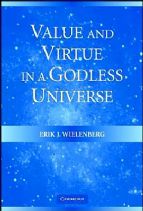In this chapter Erik Wielenberg defends the notion of naturalistic virtues. More specifically he explains how naturalism can accommodate the Christian like virtues of humility, charity, heroism, and hope.
Humility
A naturalist can be humble by giving proper credit to their accomplishments. This seems like the opposite of humility, but it is not. This is because in the naturalistic universe, just as in the theistic there are many matters that are out of our control. Thus when a naturalist gives proper credit to their accomplishments they must realize that their accomplishments are contingent on multiple factors environment, genetics and so on. Wielenberg says "In the naturalistic universe, each of us should recognize the tremendous accomplishment dumb luck has made to all human accomplishments, and that in the case of any such accomplishment, the majority of the credit goes to blind chance."
From Humility to Charity
Our economic status is completely contingent on our demographic location (there are arguably other factors as well, but this one is obvious). Some of us are born in affluent countries, others are not so fortunate. Since our socioeconomic status is simply a matter of where we born, in the majority of cases it is out of our hands. Realizing this, the naturalist (and anyone else it seems) is obligated to help alleviate the sufferings of their brethren. Wielenberg gives the following metaphor: Imagine a planet where everyone parachutes down at random places on the planet. Some people are fortunate and land in a luscious forest full of food and luxury, others land in a desert where they are on the brink of starvation. Do the fortunate have an obligation to help the unfortunate. It seems as thought they do since their roles could have easily been reversed, and because the created situation is out of human control. The natural world is similar in this way, some of us are affluent others are poverty stricken due to factors out of our control. Thus humility can lead to charity.Heroism and Hope
Wielenberg says that "the naturalists self-concept out to be as a hero, struggling to satisfy the demands of morality and secure a life of internal meaning for the individual and for loved ones in a universe which is at best utterly indifferent and at worst downright hostile to both projects... I suggest that the naturalists view themselves as engaged in a struggle against a wild animal. The struggle is not on the battlefield where conflict rages between the forces of dark and light and where victory and salvation are assured only for the right side. Rather, the struggle is to tame an uncaring, irrational beast, and success is anything but certain; everyone has something of the beast inside and an important part of the struggle is conquering this inner monster." And where does hope fit in? Well we can be hopeful for several reasons. One which Wielenberg gives is science. Science gives us hope because it helps understand this "wild animals." Through science we can understand our biases and inner prejudices and test empirical methods which can improve peoples behavior. Further it seems plausible to suppose that history has progressed, moral standards have improved at least a little. The practice of slavery and sacrifice has been cut back significantly by human beings. Although there are problems galore and immense daily suffering, the naturalist can be hopeful for a better future.
This concludes the discussion of Wielenberg's conceptions of virtue in a godless universe. His final words are poignant: "Without God, there is no guarantee that we will be able to save ourselves from ourselves. But neither is there a guarantee that we will fail. There is room for hope. My suggestion is that we focus on the attempt."

No comments:
Post a Comment